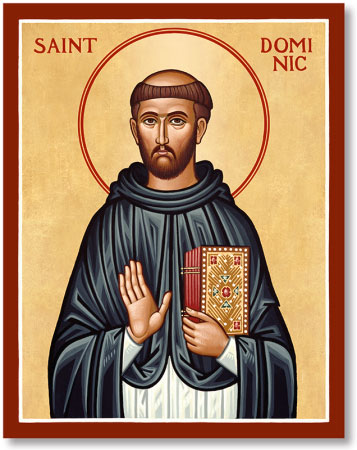 One who plants (1216 – 1221)
One who plants (1216 – 1221)
October 31, 2017 marks the 500th anniversary of the Protestant Reformation. While the Episcopal Church “is not strictly a Protestant church, but rather a Catholic Church that has been shaped and reformed by the [Protestant] Reformation,” we are free to celebrate our theological inheritance with Protestant churches around the world (Goodrich, 2014, p. 8).
The Roman Catholic priest Martin Luther has become infamous for inciting the Protestant Reformation by literally nailing his 95 Theses to the door of All Saints' Church. A lesser known fact is that Luther was also a member of a religious order named the Order of Saint Augustine (O. S. A.). However, about 300 years before Luther’s prophetic act on October 31, 1517, Pope Honorius III approved another religious order named the Order of Preachers (O. P.) on December 22, 1216 under the extraordinary leadership of Saint Dominic de Guzmán (Goergen, 2016).
Who is Saint Dominic?
Dominic de Guzmán was born (ca. 1172) in the agricultural town of Caleruega, present-day Spain. The son of a devout Roman Catholic mother named Jane, Dominic was chosen by God to be a preacher of reformation from birth. While in prayer for her yet unborn child, Jane received a divine vision in which “she saw herself with a little dog in her womb, with a blazing torch in its mouth, who set the world on fire” (Goergen, p. 4).
“So neither the one who plants nor the one who waters is anything, but only God who gives the growth” (1 Corinthians 3:7 NRSV)
Dominic completed his postsecondary and graduate theological studies in Palencia prior to his appointment as cathedral subprior in Osma by January of 1201. Having learned the craft of Biblical exegesis in Palencia, Dominic first tried his hand at apologetics during theological debate with the Cathar dualists at Montreal in March of 1207. We know that Biblical exegesis, not philosophical argumentation, was the primary content of his apologetics from the writings of his successor Jordan of Saxony. To add further weight to this assertion, “Brother John of Spain, remarked that he [i.e. Dominic] ‘always carried around with him the Gospel of Matthew and the letters [i.e. epistles] of Paul,’ and ‘studied them so much that he knew them by heart” (Murray, 2006, p. 82).
At the height of his scholarship, Dominic’s skills in Biblical exegesis and apologetics were recognized by brothers Thomas and Peter Seilhan in 1215. Together, the three founded a diocesan preaching institute in Toulouse. Jordan of Saxony summarizes Dominic as a voracious scholar whose willing mind “was able to penetrate the mysteries of difficult theological questions with the humble understanding of the heart” (Murray, p. 81).
Not only did he preach against the gnostic heresy of his day, but Dominic preached against the hypocrisy of Roman Catholic “Clerics [i.e. priests] living sinful lives” who were only skilled at administering the sacraments but were inept preachers of the Gospel (Goergen, p. 51). Canonized by Pope Gregory IX on July 3, 1234, Dominic died in Bologna on August 6, 1221. About 300 years later, Saint Dominic’s fiery legacy of preaching for the salvation of souls and the reformation of the Catholic moral tradition would burn again in the heart of Martin Luther (Atkinson & Field, 1995).
One who waters (1517 – 1999)
Among the laundry list of sins attributed to the Roman Catholic Church of his day was “the sale of indulgences that provoked Luther’s protest” (González, 1984, p. 374). Like Saint Dominic who had planted the seeds of reformation some 300 years before him, Luther maintained Holy Scripture as the single most authoritative source of Christian faith and practice. In fact, from among the many slogans of the Protestant Reformation emerged the phrase sola Scriptura, (i. e. Scripture alone).
God who gives the growth (1999 – Present)
Over 780 years after the papal recognition of the Dominicans as a Roman Catholic society, the Episcopal Church founded its own Anglican Order of Preachers in August of 1999. Please pray for Abe and other postulants discerning a call to religious life within the Anglican Order of Preachers.
"O Lord Jesus Christ, you became poor for our sake, that we might be made rich through your poverty: Guide and sanctify, we pray, those whom you call to follow you under the vows of poverty, chasity, and obedience, that by their prayer and service they may enrich your Church, and by their life and worship may glorify your Name; for you reign with the Father and the Holy Spirit, one God, now and for ever. Amen."
(Book of Common Prayer, 2016, p. 819)
About the Author
Abe Parker is a postulant in the Anglican Order of Preachers who holds a Master of Arts with an emphasis in Pastoral Ministry from Grand Canyon University and is a doctoral candidate in the School of Education at Northcentral University. A liturgical scholar of the Black church tradition, Abe has served as a Children’s Minister at Saint James-by-the-Sea of La Jolla and currently serves as Lector at Saint Luke’s Episcopal Church of San Diego.
References
Atkinson, D. J., & Field, D. F. (1995). New dictionary of Christian ethics and pastoral theology. Downers Grove, IL: InterVarsity Press.
Book of Common Prayer. (2016). New York, NY: Church Publishing Incorporated.
Goergen, D. J. (2016). St. Dominic: The story of a preaching friar. New York, NY: Paulist Press.
González, J. L. (1984). The story of Christianity, Volume 1: The early Church to the dawn of the Reformation. New York, NY: HarperCollins.
Goodrich, K. (2014). Anglican Dominicans: An introduction for seekers and the curious. San Bernadino, CA: CreateSpace.
http://www.anglicandominicans.com/
Murray, P. (2006). The new wine of Dominican spirituality: A drink called happiness. New York, NY: Burns and Oates.
